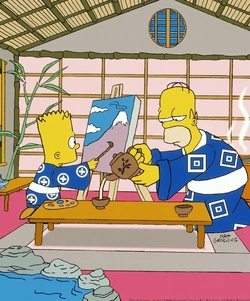Thirty Minutes Over Tokyo (The Simpsons): Difference between revisions
(Created page with "thumb|frameless|right|400px|Thirty Minutes Over Tokyo “Dad, we didn't come halfway around the world to eat at "Americatown".” ―Lisa "Thirty Minutes Over Tokyo" is the twenty-third and final episode of Season 10. Original Airdate: May 16, 1999 ==Guest Voices== * George Takei as Wink * Denice Kumagai as Japanese Mother * Karen Maruyama as Japanese Stewardess * Gedde Watanabe as Japanese...") |
mNo edit summary |
||
| Line 33: | Line 33: | ||
[[Category: Television]] | [[Category: Television]] | ||
[[Category: The Simpsons]] | [[Category: The Simpsons]] | ||
[[Category:TV Episodes]] | |||
[[Category:🇯🇵]] | [[Category:🇯🇵]] | ||
[[Category:Fictional]] | [[Category:Fictional]] | ||
Revision as of 21:17, 25 August 2022

“Dad, we didn't come halfway around the world to eat at "Americatown".” ―Lisa
"Thirty Minutes Over Tokyo" is the twenty-third and final episode of Season 10. Original Airdate: May 16, 1999
Guest Voices
- George Takei as Wink
- Denice Kumagai as Japanese Mother
- Karen Maruyama as Japanese Stewardess
- Gedde Watanabe as Japanese Father/Waiter
- Keone Young as Sakatumi and Fish
When Snake Jailbird steals money from the Simpson family's bank account through the Internet, the family goes on a budget and save plenty to buy a trip to Japan. The Simpsons thoroughly enjoy the country, but when an accident takes away their last million yen, they agree to participate in a dangerous Japanese TV game show in exchange for the air fare back home.
At the Royal Tokyo hotel, Homer discovers that the Japanese are years ahead of America, having a talking toilet in the bathroom that sprays fountains of multi-colored water, while Bart discovers the TV has a camera that shows footage from the toilet. This gadget soon appalls Bart, Lisa and Marge, as Homer makes use of the multi-gadget toilet.
They start buying various things that cost a fortune there. Homer buys a square watermelon but it turns into a normal round shaped one causing him to accidentally drop it and smash on the ground wasting his money. Lisa wants to do something Japanese but Homer and Bart blatantly refuse and would rather ignore the wonders of another culture, running off when Lisa suggests something traditional. The only piece of Japanese culture Bart is willing to take in is the shows that are aired on T.V., one of which is entitled "Battling Seizure Robots" causing the entire family to collapse on the floor in convulsions. After recovering, they visit America Town, an American-themed restaurant, and then they are forced to go to the Sumo fights, Homer is arrested for attacking the emperor, whom he thought he was a sumo wrestler. After being freed from prison (where Homer and Bart learn of Japanese culture and the secret to inner peace), the Simpson family is down to their last one million Yen, which they need to get home. Homer folds the money into a flying crane origami to show Lisa "something Japanese", which is then blown away in the wind, Homer cries "D'oh!" in Japanese.
They try to earn money by gutting fish at the Osaka Fish Concern. While working, they see on the work TV an advert for the Super Happy Smile Time Family Wish Show, which grants the winners anything they wish for.
When taking off for their return trip home, the Simpsons' plane is attacked by Godzilla, who happens to also be battling Rodan, Mothra, and Gamera. However, the family, in particular Lisa, were so exhausted from the events of their stay that they proceeded to fall asleep through the entire spectacle. Their plane wriggles free, and they fly off to Springfield without any further incident.
Censorship/Controversy
"Thirty Minutes Over Tokyo" is one of two episodes that never aired in Japan (the other being the Season 11 episode "Little Big Mom", banned for featuring leprosy). The reasoning behind this was that a scene in the episode, which shows Homer throwing Akih, the then current emperor of Japan, into a box filled with sumo thongs, was considered disrespectful. There was also a rumor that Sanrio and Hello Kitty creator Yuko Shimizu were outraged by the inclusion of the Hello Kitty factory featured briefly in the episode. The episode has become study material for sociology courses at University of California Berkeley, where it is used to "examine issues of the production and reception of cultural objects, in this case, a satirical cartoon show", and to figure out what it is "trying to tell audiences about aspects primarily of American society, and, to a lesser extent, about other societies".